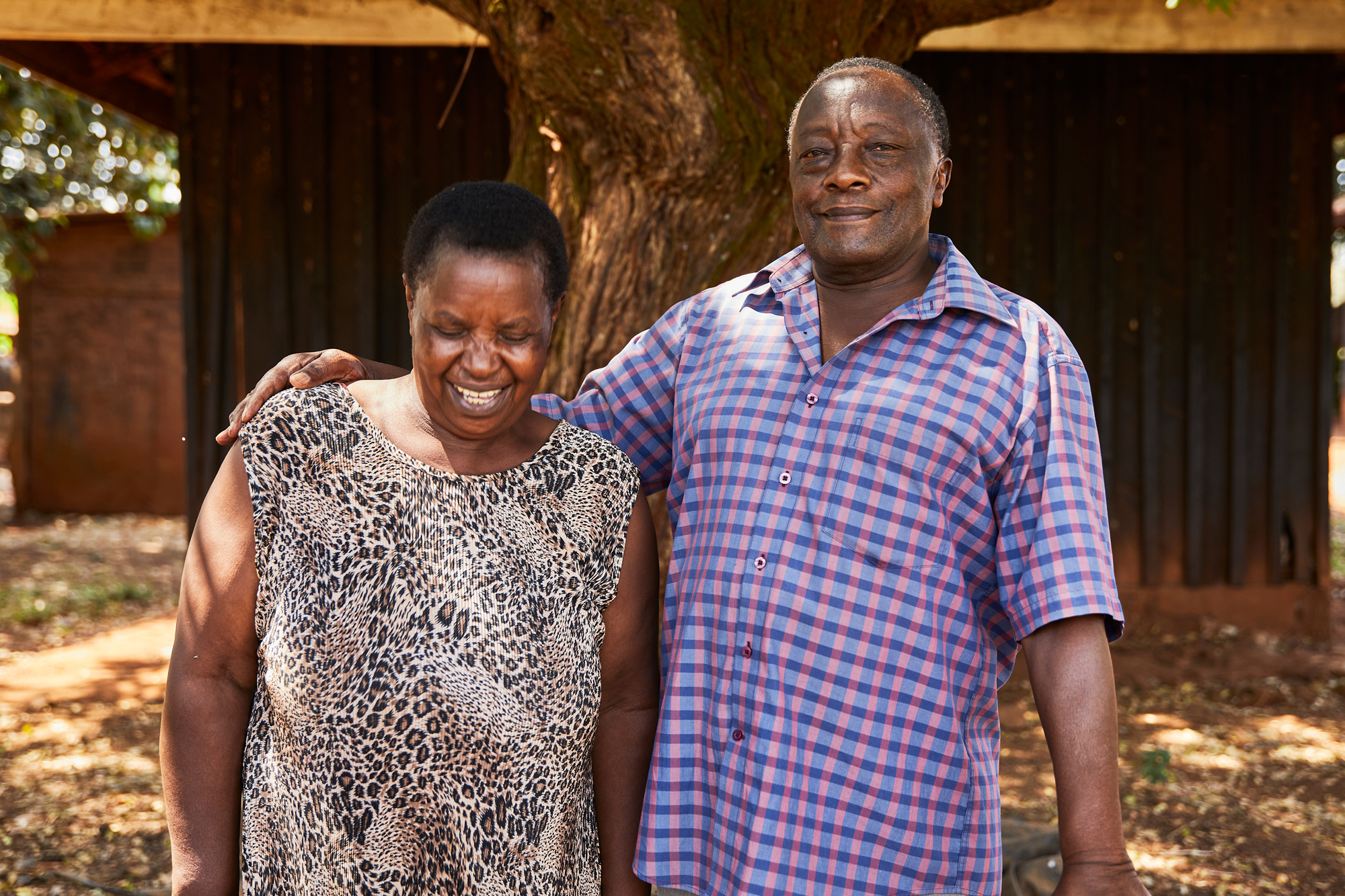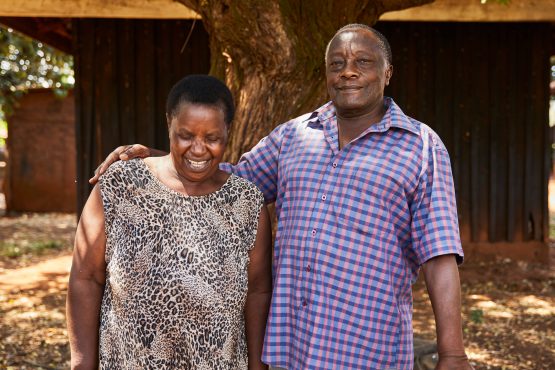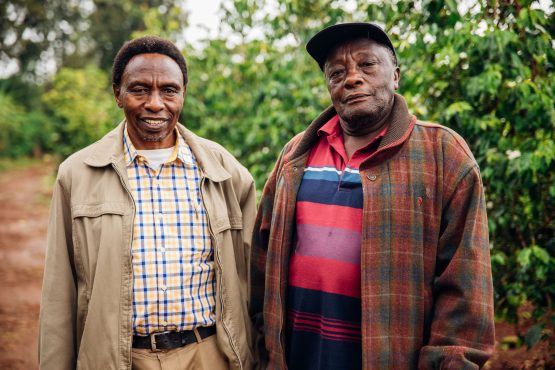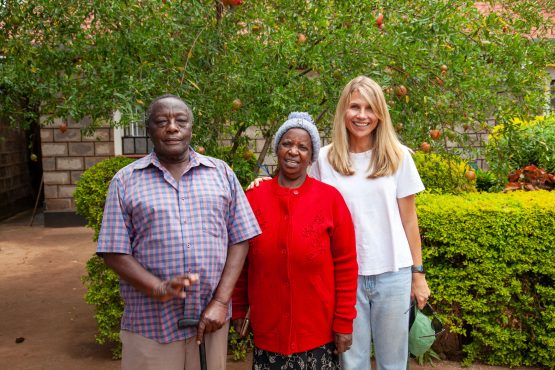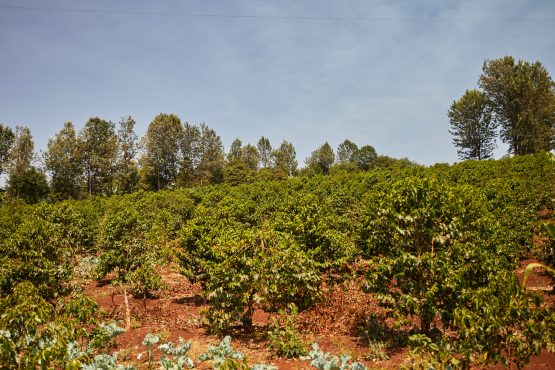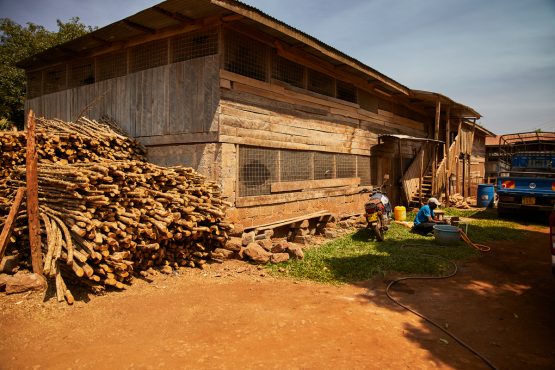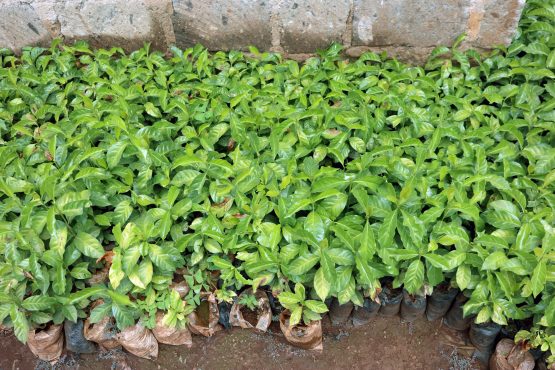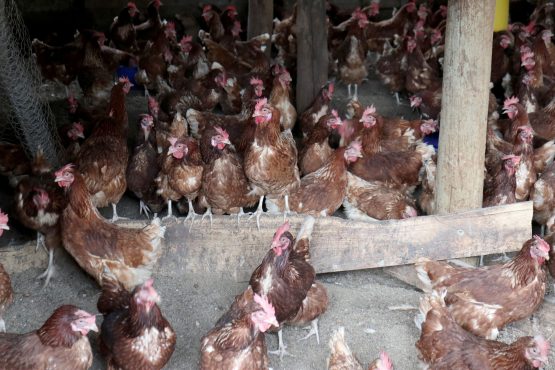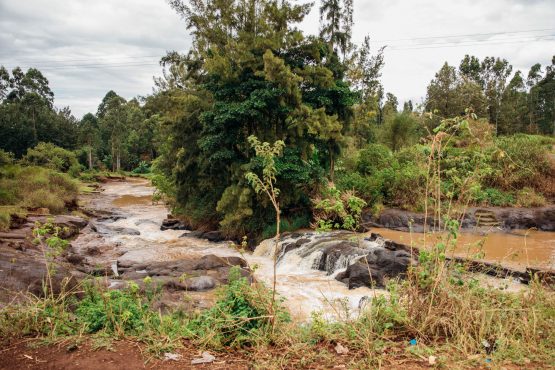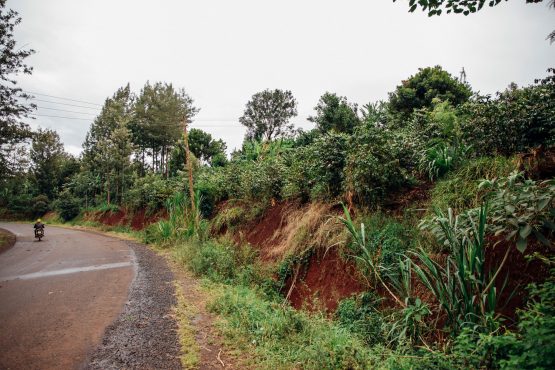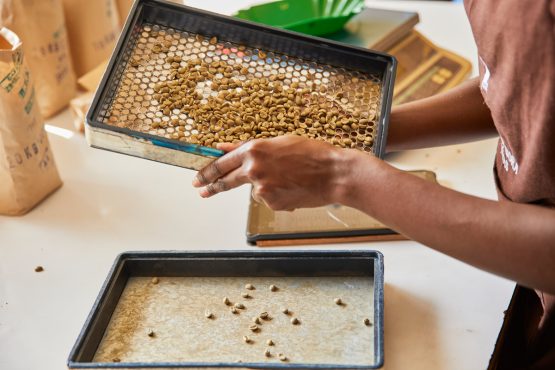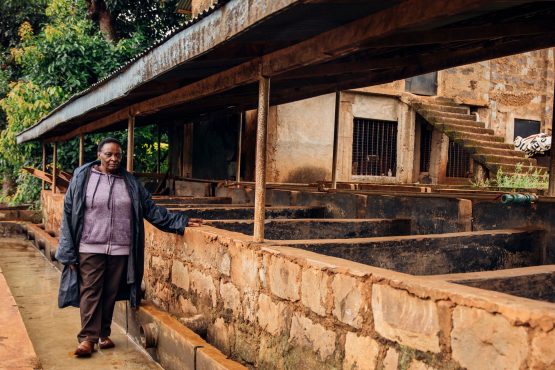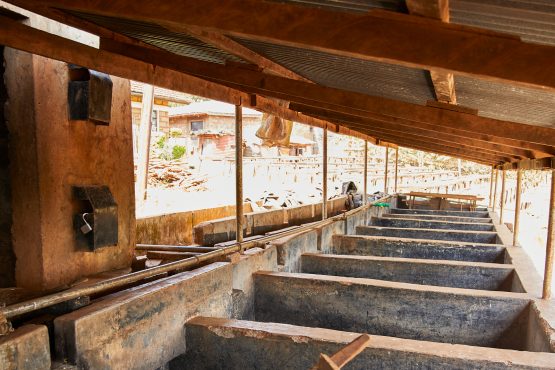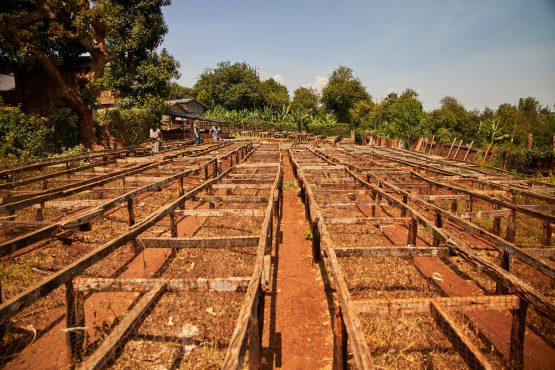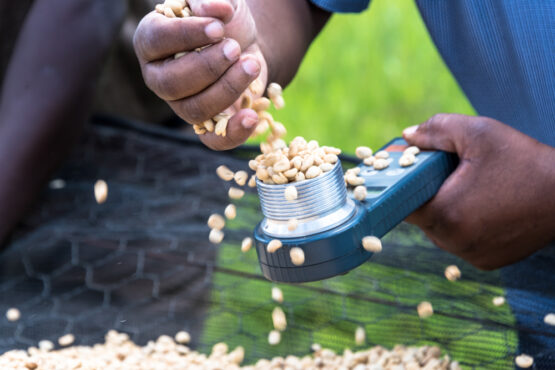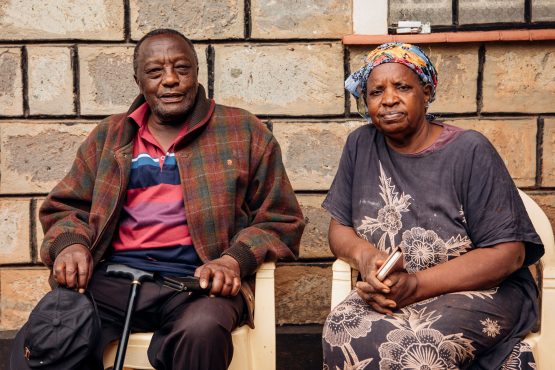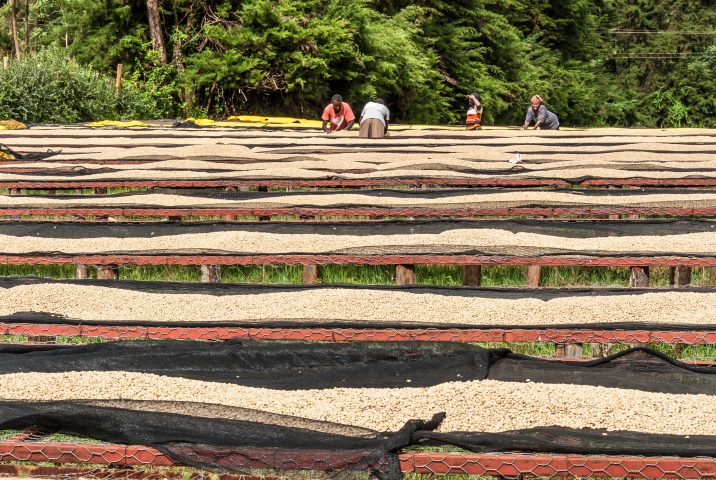Dagitu Estate AA
Complex and floral, with sparkling acidity. Green apple, plum and lingering rose hip fragrance.
Dagitu is a five-hectare coffee farm located in Kiambu County, in Kenya’s central highlands, owned and managed by Danson Wanyutu Karugondo and his wife, Josephine. The farm was initially part of a larger estate, Muhathi, which was inherited by Danson and his siblings on their parents’ passing and divided into three plots: Dagitu, Muhathi and Ndocha. Danson and his siblings, Peris and Geoffrey, manage their shambas (Swahili for farm) independently and share a wet mill (or factory, as they are known in Kenya) which was built by their father in the 1980s. Each sibling processes and markets their coffee as a separate lot.
Like many coffee farms in the region, the estate was established in the early 1960s, when the siblings’ grandparents planted 100 trees in the wake of the 1952 Mau Mau uprising and the resulting land reforms, which allowed Kenyan nationals to own and plant coffee farms. Prior to these reforms, all coffee estates in the country were owned by British exporters who strictly regulated the industry to exclude African Kenyans.
Dagitu is Danson’s passion project: just under five hectares of land where he can grow and produce coffee specifically for the specialty market. The shamba is beautifully maintained by Danson, Josephine, and son Gishu (who lives at the homestead with them), with coffee intercropped with banana, avocado and macadamia trees to provide shade; and potatoes, squash and cassava to provide ground cover. Danson has lived his entire life on the estate and says he “has been farming coffee since birth.” Along with managing their plot, Danson actively helps brother Geoffrey, who lives in Nairobi, with looking after day-to-day operations of Ndocha.
The entire property, totalling about 25 hectares, sits in the foothills of the extinct volcano Mt. Kenya, nearby the Komothai river, in an area defined by its bright red, nutrient-rich, volcanic soil and cool climate. The geographical conditions of the region are ideal for exceptional coffee production and contribute to the outstanding quality of this lot. Besides coffee and sustenance crops, Danson and Josephine run a successful poultry farm with some 3,500 chickens and hens, whose eggs are sold throughout the region. They also raise cows and pigs, which provide manure to produce excellent compost, when mixed coffee pulp that is a by-product of washed processing.
The main variety grown on the farm is SL28, with a tiny amount of SL34. Both were selected and planted by Danson’s grandfather between 1967 and 1972. The trees have been continuously regenerated since that time, using a stumping technique where new stalks are allowed to grow from the stump to replace older stalks, which are then cut back when the new stalks reach full maturation. In recent years, trees at Dagitu have struggled with the effects of climate change, as productivity has nearly halved, and incidences of coffee leaf rust and coffee berry disease have increased. While his siblings have chosen to introduce small amounts of more resistant hybrids Batian and Ruiru 11 at their shambas to positive results, Danson has avoided this for now.
The coffee’s processing was overseen by Danson’s sister, Peris, who lives at the original farmhouse alongside the shared factory. The family has been processing their own coffee since 1987, when their father first built the infrastructure for processing. The on-site facility was constructed with great care and expertise, modelled on a local cooperative’s factory which their father managed, to ensure bottlenecks are avoided during the peak of the harvest. Outside of the additional investment in establishing and operating an onsite factory, it is far costlier to mill and market small volume, single producer lots than large day lots from cooperatives. This investment has paid off, however, as the siblings produce exceptionally high-quality lots, and Danson is able to command excellent prices for his coffee crop each year.
Since the Kenyan government’s coffee trade reforms of 2023, we have been sourcing Danson and Jospehine’s coffee directly, with the help of Wycliffe Murwayi as the marketing agent. To secure direct sales, Danson has opened a USD account and is now responsible for producing the required documentation for export. The benefits of the direct model are higher profits, as the buyer (in this case, MCM) must offer competitive pricing to secure the coffee, and a faster turnaround time between the sale and the grower receiving their payments. Direct sales also support a more meaningful and values-led relationship between the growers and their buyers and have become more widespread as the coffee sector adapts to the reforms.
ABOUT KIAMBU
Kiambu County is part of Kenya’s former Central Province, which was dissolved in 2013. The area includes Murang’a, Nyeri, Kirinyaga, Kiambu and Nyandarua Counties, and is traditionally the homeland of people of Kikiyu ethnicity. The central highlands of Kenya are considered to be one of the wealthiest areas of the country, due to the incredibly fertile land, geographical proximity to the capital, Nairobi, and close integration with the country’s colonial administration before Kenya gained independence in 1962. This integration afforded the communities of Central Kenya with opportunities for education, business and political prowess, despite the various injustices of the colonial government. The Kikiyu people have a long and proud history of agriculture and the region is farmed intensively, with coffee, tea and dairy being the most important modern crops.
Like Danson, many of the producers in the region are second-generation landholders, whose parents purchased and planted coffee shambas in the 1950s and 1960s, after agricultural reform allowed for small Kenyan farmers to produce cash crops on their family farms (instead of only on large, British owned estates). At that time, it was recommended to plant SL28 and SL34, which remain the predominant varieties found in the area and make up the majority of this lot. Both cultivars have Bourbon and Moka heritage and are named after the laboratory that promoted their wider distribution in Kenya during the early 20th Century: Scott Laboratories. Farmers in Kiambu grow coffee as a cash crop alongside food crops like banana, maize, macadamia, avocados and vegetables. Tea and dairy are also important sources of income for the producers.
GRADING
Kenya uses a grading system for all its exportable coffee lots. The grading system is based on the size and assumed quality of the bean. A coffee’s grade is directly correlated with the price it attracts at auction or through direct trade.
This micro-lot is graded as an AA. This grade is easily defined by size (in this case, AA means that the beans are screen size 18 and above) and to a certain extent, quality. While it is assumed that AA lots represent the highest quality, we have often found AB and peaberry lots to be just as good.
To cement our relationship with Danson we purchased his entire exportable production this year, which ensures that he receives a good price for all grades of his coffee.
HOW THIS COFFEE WAS PROCESSED
During harvest, the siblings employ up to 50 local pickers who have been trained to pick only the ripest red cherry. The pickers meticulously hand sorted the cherry to remove any under ripes before processing. Pickers are paid by volume of fruit picked, or on a day rate when there isn’t much cherry to collect.
After sorting, the coffee was pulped in the late afternoon of the day it was picked, using a three-disc pulping machine, which removes the skin and fruit from the inner parchment layer that protects the green coffee bean.
The parchment was then dry fermented overnight, or up to 24 hours depending on the weather, to break down the sugars and remove the mucilage (sticky fruit covering) from the outside of the beans. The coffee was checked from the following morning onwards, and when it smelled ready, it was rinsed and removed from the tanks.
Using clean water from the nearby Komothai River, the parchment-covered coffee was then washed and graded in water channels, before being transferred to raised drying tables. During the drying stage, which takes up to three weeks, the coffee was turned constantly to ensure it was dried evenly, until it reached 11–12% humidity. To protect it from the elements and avoid condensation, all drying parchment is packed and put away during the night, and laid out to dry again in the morning.
After the coffee reached the targeted moisture content, it was transported to the local Komothai County mill before being processed for export. Danson and his siblings chose this particular processing site for their coffee because they offer some of the best traceability in Kiambu.
WHAT’S IN A NAME
Dagitu (pronounced “dah-gee-too”) is a combination of the first syllable of Danson’s and his eldest son, Gitu’s, names, and the last syllable of his family name, Wanyutu. Danson hopes that Gitu will eventually take over managing the shamba, just as he inherited his land from his parents.
